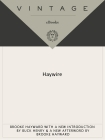Haywire, Brooke Hayward [the best ebook reader for android TXT] 📗

- Author: Brooke Hayward
Book online «Haywire, Brooke Hayward [the best ebook reader for android TXT] 📗». Author Brooke Hayward
Although Father was by no means paternal by nature, he was beginning, as we grew more capable of expressing ourselves and establishing a verbal rapport with adults, to take as much interest in us as we had in him.
“Your mother and I have absolutely opposite points of view about children,” he stated one evening, trying to teach us how to play chess. “She’s most fascinated by them when they’re babies, and babies categorically don’t interest me at all, little pieces of hamburger meat—and listen, no question about the fact that, as babies go, you three were sensational—but the point is, now that you’re getting older and I can see how your brains are starting to work, thank God, now that’s an interesting process to me, and I feel as if I’m part of it. It’s about time.”
Father was always on the move, packing his overnight case engraved with the logo LH 10%, flying back and forth between New York and California even more frequently than before—working much too hard, said Mother. Bridget, Bill, and I were so accustomed to his trips that we accepted them as a matter of course. However, we looked forward to his return home, even from the office, with such excitement that the minute he walked in the door we jumped all over him and wouldn’t let him out of our sight until bedtime. Then, even if he and Mother had to go out, we would cling to him and beg him and badger him and trap him in our room until he had given us the latest installment of a marvelous, labyrinthine, never-ending tale he improvised for us in what had become a nightly routine. One night when he unexpectedly couldn’t come home for dinner, we were so disappointed that we wouldn’t eat. The next morning I wrote him a letter at his office,
Dec. 5, 1946
Darling Father,
I am very unhappy that you are not feeling well, and it was pretty lonely last night without you.
Mother had supper with us and this morning she had breakfast with us too.
Bridget and Bill have gone to school. I am all by myself writing this letter to you, with a great deal of love.
You should have heard the coyotes last night! I didn’t hear them, but Emily did, and she said that they were awful.
Bridget, Mother, and Emily are making doll’s clothes for Bridget’s rubber doll.
Anyway I miss you more than anything.
Lots of love,
Brooke
One afternoon when the Tocaloma Club station wagon pulled up to our garage to let us off, an ambulance was waiting. While everyone watched, aghast, two attendants in white came down the steps carrying a stretcher with Father on it. Before we could move, the stretcher vanished into the back of the ambulance, doors closed, red lights began to flash, and, with an ominous sound, the ambulance was gone.
We had never seen Mother cry before. It was very serious, she said: Father had hemorrhaged again from the strain of working too hard. He needed lots of rest and blood transfusions and would be in the hospital for a long time, and we couldn’t go with her to visit him in the hospital until he was out of danger, because it wasn’t allowed, but we could help a great deal by being very brave—that would help her to be brave, too—and by saying prayers for him every night and every day as well. We were heartbroken. It was terrible to see Mother cry and terrifying to remember what Father had said to me that day when he and I had walked away together from the chicken coop; if, as he’d said then, the sight of a drop of blood made him afraid to death, suddenly I knew how much more afraid he would be at the idea of bleeding, literally, to death.
He didn’t bleed to death, although he was in the hospital for a long time; everyone was very relieved, Mother reported to us, that he didn’t have to be opened up again, but we felt, during that time, as though somehow somebody had died anyway. The air inside the house changed color and became dark gray as if all light were filtered through drawn shades, reminding me of the heavy gray velvet on the walls of my grandfather’s room—the room in Maisie’s house where we visited him once just before he died—even the windows and fourposter bed draped in gray velvet with gold tassels, impressive and hushed, until Grandfather, alone, without the nurse’s help, went into his bathroom. “Excuse me for a moment,” he said courteously, closing the door behind him, and we could hear him coughing and coughing, viscerally, as if he would never stop, while Father, agonized, stood at the window’s gray light, playing with a gold tassel and looking down at the traffic on Fifth Avenue.
Also the house was quiet because around this time Mother, too, became ill. An





Comments (0)